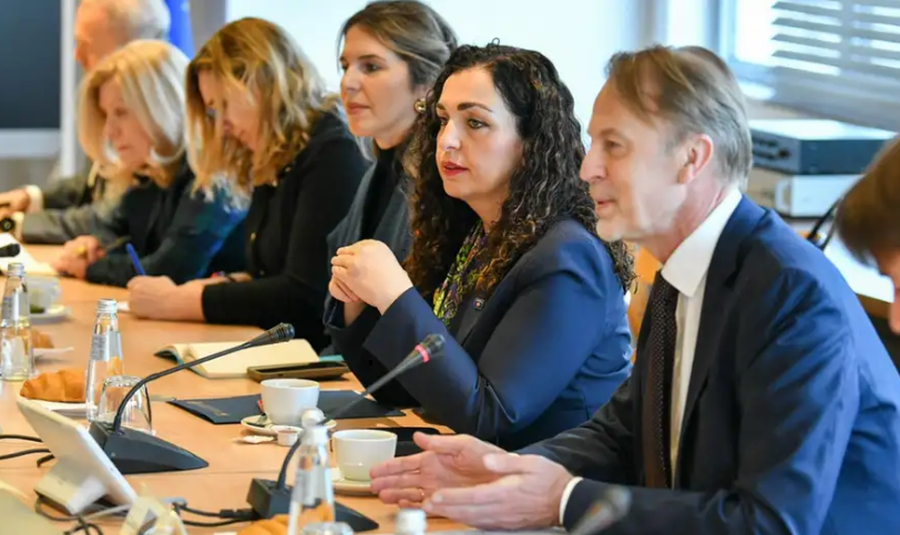
After almost two years since the imposition of punitive measures against Kosovo, the EU continues to refuse to lift them, despite requests from political leaders in Pristina or the European Parliament.
Kosovo President Vjosa Osmani has called on the European Union to lift the punitive measures against Kosovo, calling it an emergency. According to her, "these measures are unjust, harm the citizens of Kosovo and violate the very principles of the EU." President Osmani made this request at a meeting with the ambassadors of European Union member states in Kosovo.
"Kosovo remains steadfast in its European journey and committed to cooperation with the aim of advancing on this journey," said President Osmani, who also discussed with EU ambassadors the steps towards the constitution of the new institutions resulting from the February 9 elections, as well as the EU-mediated dialogue process.
Punitive measures against Kosovo for two years
The European Union imposed punitive measures against Kosovo in June 2023 due to tensions in the north of the country, inhabited by a Serb majority, and due to the uncoordinated actions of the Kosovo government led by Albin Kurti.
The measures against Kosovo include the freezing of some EU funds and the temporary suspension of the work of the Stabilisation and Association Agreement bodies. Kosovo is also not invited to high-level events and bilateral visits have been suspended, except for those focused on addressing the crisis in northern Kosovo within the framework of the EU-facilitated dialogue. Other EU measures against Kosovo include the suspension of the programming of funds for Kosovo under IPA 2024.
Steps to de-escalate the situation in the north still insufficient
These measures remain in place and, according to European officials, Kosovo has not yet done enough to de-escalate the situation in the north of the country. An EU spokesman said that "the EU's temporary measures are reversible and the Council has already set conditions for their gradual lifting, which are linked to steps taken by Kosovo to reduce tensions in the north."
Despite these measures, the government led by Albin Kurti did not give up on its actions in the north, while describing the EU measures as unfair, saying that it "cannot compromise with the rule of law and the constitutionality of the country". Over a 20-month period, Kurti's government abolished the Serbian dinar, closed most of Serbia's parallel institutions, and defended this policy as an extension of the authority of Kosovo institutions in the north.
European Parliament in favor of lifting measures
The European Parliament called on the structures of the European Council to lift the measures against Kosovo, which, as stated in a document by the rapporteur for Kosovo, Riho Terras, "are no longer reasonable and are in contradiction with Kosovo's proven commitment to European values and its alignment with EU policies."
At the meeting with EU ambassadors in Kosovo, the country's President, Vjosa Osmani, also discussed the steps towards the constitution of new institutions resulting from the February 9 elections. The result of these elections, although already known, has not yet been certified by the Central Election Commission due to complaints from several political parties, mainly the Vetëvendosje Movement, led by Albin Kurti.
EU funds require the constitution of the Kosovo Assembly
Kurti's party came first, winning 42.30 percent of the vote, or 48 seats in the 120-seat Kosovo Assembly. The Democratic Party of Kosovo came second with 20.95 percent, followed by the Democratic League of Kosovo (LDK) with 18.27 percent. None of these parties managed to win at least the 61 seats needed to form a new government on their own. Coalitions are inevitable. Prime Minister Kurti says he is waiting for the certification of the results before sitting down and looking ahead. And to secure some EU funds, the constitution of the Kosovo Assembly is needed in advance, which with the necessary two-thirds of the votes must ratify international agreements that include receiving some EU funds.
The European Union has approved a €6 billion economic growth plan for the Western Balkans in an effort to help speed up the integration process. Unlike the other four countries in the region, Kosovo and Serbia have been given additional preconditions in order to benefit from the EU's €6 billion Western Balkans Growth Package. The main condition for Pristina and Belgrade is that both countries engage constructively with measurable progress and tangible results in the normalization of relations between them./ DW (A2 Televizion)










